A five-judge Supreme Court bench on September 26 upheld the constitutional validity of Aadhaar, however, it has struck down multiple sections of the Aadhaar Act as unconstitutional. Justice AK Sikri while reading the judgement said, “Aadhaar gives dignity to the marginalised. Dignity to the marginalised outweighs privacy.” He also observed that Aadhaar fails only 0.232% and dismantling it now would mean disturbing 99% of the population who have already been enrolled.
The Supreme Court upheld the constitutional validity of Aadhaar and said that it empowers the marginalised sections of the society. However, it ruled that the Aadhar is not mandatory for school admissions and mobile phone connections
Read @ANI story | https://t.co/j7g8i0LkOv pic.twitter.com/byvG4xOo8v
— ANI Digital (@ani_digital) September 26, 2018
Reportedly, Justice Sikri pronounced the judgement on behalf of himself, the CJI and Justice Khanwilkar while Justice Chandrachud and Justice A Bhushan have written their individual opinions. While the majority judgement upheld Aadhaar, Justice Chandrachud while reading his judgement held that the passage of the Aadhaar Act as a Money Bill is a fraud. Justice Chandrachud is the only dissenting judge who pronounced the Aadhaar Act to be unconstitutional.
Which sections of the Aadhaar act have been struck down?
The five-judge constitution bench has struck down Section 57 of the Aadhaar (Targeted Delivery of Financial and Other Subsidies, Benefits and Services) Act, 2016 which previously allowed private entities to use Aadhaar number for verification purposes.
The bench has also struck down a clause which allowed the Aadhaar governing body, UIDAI, to share data with specially authorised officers in the interest of national security. Justice Sikri also stated that Aadhaar metadata cannot be stored for more than six months, whereas the act allows the storage of such data for up to five years.
What’s valid and what’s not?
The Supreme Court has upheld section 139AA of the Income Tax Act which mandates the linking of Aadhaar to PAN cards. However, it has said that the administration cannot make Aadhaar compulsory for school admission, and the requirement of Aadhaar by statutory bodies such as CBSE, NEET has also been struck down. It also said that linking of Aadhaar card with mobile numbers is unconstitutional.
#CORRECTION: Supreme Court on #Aadhaar: Aadhaar is NOT mandatory for UGC, NEET & CBSE examinations. (Original tweet will be deleted) https://t.co/KaCTudDHtb
— ANI (@ANI) September 26, 2018
Some Key points from the SC majority Aadhaar verdict
Here are some of the key takeaways from today’s verdict which was pronounced by Justice Sikri:
- The government needs to ensure that no illegal migrants get Aadhaar.
- Asks Centre to introduce strong data protection laws soon
- Aadhaar not mandatory for opening bank accounts
- The bench stated, “minimal demographic & biometric data of citizens are collected by the UIDAI for Aadhaar enrolment. Aadhaar number given to a person is unique & can’t go to any other person.”
- He also said, “There is a fundamental difference between Aadhaar card and identity. Once the biometric information is stored, it remains in the system.”
Also Read: 6 Years, 26 Judges And At Least 27 Petitioners: Here’s A Look At Aadhaar Case Timeline












